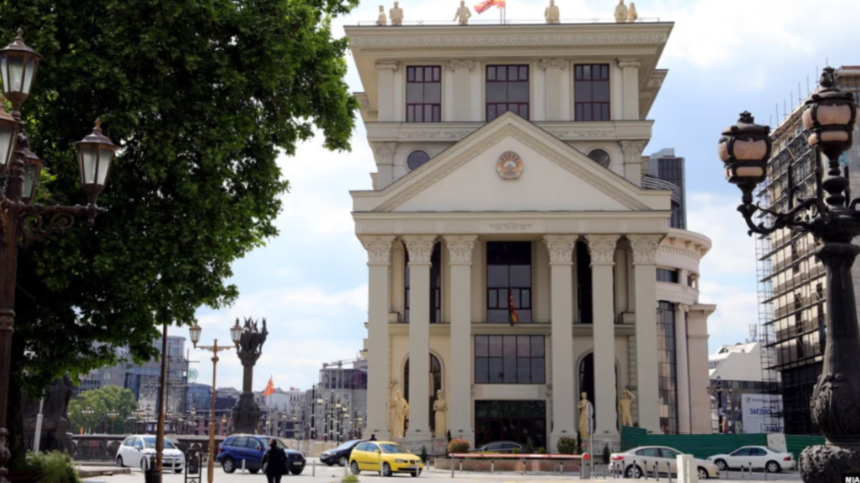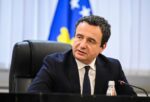Officials in North Macedonia have strongly condemned a statement made by the leader of the far-right party in Bulgaria, who called for the unification of North Macedonia and Bulgaria into a single state, based on an idea recently expressed by the elected US President, Donald Trump, about the unification of the USA with Canada.
The leader of Bulgaria’s far-right political party, Revival (Prerodbas), Kostadin Kostadinov, said on Thursday, “There is nothing more logical than for two countries with a shared history, common origin, common language, and common people, such as Bulgaria and North Macedonia, to become one state.”
This statement was condemned as “shameful and dishonest” by the President of North Macedonia, Gordana Siljanovska-Davkova.
“On the contrary, the attempt to express this unilaterally in this manner actually means disrespect, it means non-recognition,” said Gordana Siljanovska-Davkova.
The Ministry of Foreign Affairs and Trade of North Macedonia also strongly condemned Kostadinov’s statement, who is also a current member of the Bulgarian National Assembly, saying the statement “expresses clear territorial claims against North Macedonia.”
“Such hostile statements from Bulgarian political figures are a direct attack on the sovereignty, territorial integrity, and independence of our country and, at the same time, directly contradict the rules and principles of international law, the non-interference of states in the internal affairs of others, and the policy of building good neighborly relations,” the statement said.
On the other hand, Venko Filipče, a member of parliament and leader of the Social Democratic Union (SDSM) opposition party, called on Sofia to react and distance itself clearly and unequivocally from Kostadinov’s statements, while the European Union, as he said, should condemn his statement.
“I call on the European Union to clearly condemn this position, which undermines universal human rights and European values, and to show that such statements have no place in the EU,” Filipče wrote on Thursday on his official Facebook profile.
What Did Kostadinov Say?
Kostadinov wrote that there is nothing “more logical and more normal than for two countries with a shared history, common origin, language, and people, like the USA and Canada, to become one state.”
“The same situation applies to North Macedonia. There is nothing more logical than two countries with a shared history, common origin, language, and people, like Bulgaria and North Macedonia, to become one state,” Kostadinov added.
In the same context, he also supported Trump’s claims regarding the return of control over the Panama Canal, stressing that the USA was the first owner of that area, “which they built and controlled until 1979.”
Kostadinov’s position comes at a sensitive time in the relations between North Macedonia and Bulgaria, which are related to history, identity, and language, and which have also influenced Bulgaria’s blockade of North Macedonia’s EU accession process.
Bulgaria demands that North Macedonia recognize the Bulgarian minority as a national minority. To do so, constitutional changes are required.
Meanwhile, the government in Skopje, led by Prime Minister Hristijan Mickoski, is seeking a long-term solution. Mickoski has proposed that, if adopted, the changes should be implemented with a delay, an idea that has been opposed by the EU.
On December 19, 2024, the General Affairs Council of the EU, at the Be-Balkans Summit, adopted conclusions on enlargement, for the countries of the Western Balkans. Regarding North Macedonia, the need to expedite and complete the constitutional changes was emphasized, which include the inclusion of the Bulgarian minority in the preamble of the country’s Constitution.
“The implementation of bilateral agreements in good faith and with tangible results, including the Prespa Agreement with Greece and the Treaty of Friendship, Good Neighborliness, and Cooperation with Bulgaria, remains of fundamental importance,” the statement said.
The Prespa Agreement with Greece, achieved with international mediation, enabled North Macedonia’s NATO membership, while the Treaty of Friendship and Good Neighborliness with Bulgaria, signed in 2017, aims to strengthen cooperation and resolve outstanding issues between the two countries (North Macedonia and Bulgaria), stemming from the document known as the “French Proposal.”
To implement the constitutional changes, a two-thirds majority is required. The parliamentary majority in North Macedonia currently consists of 78 MPs out of the total 120 in the Parliament.







